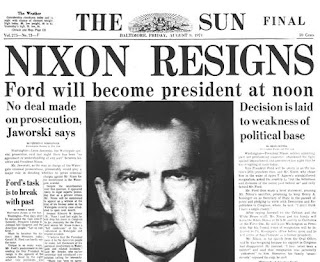The scandal came to light when five men in business suits and rubber gloves were caught in the middle of the night placing listening devices in the Watergate office complex. Three D.C police officers found the men and it was only soon after that the fourth estate had landed what would be the biggest story of their life and what would be President Nixon's worst nightmare. From what the evidence showed this was more than just a routine crime. The men were very prepared as the had walkie talkies that would pick up any police calls. They had lock picks and door jimmies which clearly stated a break in as well as tracking devices of any phone calls, conversations, and any talk that occured. The press secretary refused to give any comments on the situation days later.
The post soon assigned two reporters to the story. Bob Woodward and Carl Bernstein, both in their late twenties. Woodward had graduated from Yale, joined the navy, and then became a local reporter. Berstein on the other hand dropped out of the University of Maryland to go work at the Post in 1966. Woodward and Bernstein became a duo that spent hours upo hours covering the case. The main reason why they were so successful was because they said they let nothing "fall through the cracks".
The duo soon became known as "Woodstein" and soon broke that the Watergate scandal was linked to the White House. They started to uncover all sorts of clues, evidence, and suspicious behavior. Woodstein found out the they burglars were paid off with Nixon's campaign funds. They were kept in a special account under the supervision of U.S attorney general John Mitchell. Mind you that this was right around election time, Woodstein broke that Nixon was planning on playing dirty and sabotaging his fellow electives.
It was about four months into the investigation that the duo had concluded "what the White House dubbed a "third-rate burglary" was, in fact, the tip of the iceberg in the most astonishing abuse of power in the history of the precidency".
Although at first the two were not thrilled about working together they soon forgot about their differences and dove head first into what was anything but easiy journalism. They were relentless when it came to getter answers. They knocked on many doors and made many phone calls. One of their strategies in good journalism was to not just make phone calls but show up to places. When you're standing right infront of a person, sometimes they cant say no. These two went to extremes to get the job done. They lied, and begged to get what they needed to crack or get the next clue. Although the two were getting along just fine on their own, it is clear they might not have gotten as far as they did without the help of a close friend, and executive branch official, Deep Throat. Deep Thoat remained anonymous, never giving the two new information but verifying dozens of facts for them and dismissing any false leads they may encounter. They had gotten lucky from the insde.
Deep Throat remained anonymous for 3 decades. Him and Woodward would use signals to indicate when they would meet to discuss things. They were very secretive so that their cover couldnt be blown. In 2005 Deep Throat identified himself as W. Mark Felt. He, at the time of the Watergate scandal was the second highest official in the FBI.
The Washington Post at the time was the only source of press that was committed to covering and exposing the scandal. Other papers believed that the Post was blowing the situation out of proportion and making it more that what it was. Despite the lack of support from other press the Post stood firm in believing this was a story worth covering and investigating. It got frustrating when a year later the White House still denied everything and didnt admitt one thing. The White House was getting so fed up with the Post's persistance that they threatened to cancel stations the Post owned.
As much praise as the Washington Post deserves for their lead on the scandal and their efforts they couldn't have finished this out on their own. The post soon joined forces with all four arms of goverment. The five men involved in the burglary started to speak and wanted to negotiate for lighter sentences. Much of the stories details confirmed Woodstein's reportings. The legislative branch helped by agreeing to establish a committee that would investigate "charges of corruption in the 1972 election". The senate's part in getting involved was televising hearings which would change the minds of the public toward the White House. To bring the scandal to an all time high the legislative branch charged Nixon with "abuse of power, obstruction of justice, and contempt of Congress for defying committee subpoenas".
After hard work and determination the Washington Post had finally got the backing they needed to further their case. The White house soon collapsed and Nixon was forced to resign. Evidence was found to have been destroyed that would link Nixon to knowing about the break in before it occured. Nixon's impeachment process would soon occur being the first president to resign from office.
The Washington Post was soon awarded the Pulitzer Prize gold medal for their work. Woodward and Berstein became the dynamic duo that would always be remembered as two of the greatest reporters to ever live. No one knew how much the world would change that morning when five men committed a crime that would go down in history as one of the biggest scandals to every occur. Once again it was the work of two solid journalists/ reporters that stood up for what they believed in and what they thought was justice for the people that changed American history.
Courtesy of the Library of Congress. Modifications © 2003 Jone Johnson Lewis. Licensed to About.com.,




No comments:
Post a Comment